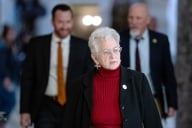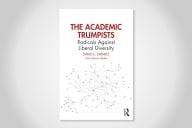You have /5 articles left.
Sign up for a free account or log in.

Two professors resigned from the University of Virginia’s Miller Center for the study of the U.S. presidency Monday, just days after their director doubled down on his controversial decision to hire a senior Trump administration official as senior fellow.
The faculty members, William I. Hitchcock, William W. Corcoran Professor of History, and Melvyn P. Leffler, Edward Stettinius Professor of History, remain chaired professors at Virginia. But they officially severed their years-long ties to the center in an open letter to William Antholis, center director. The letter cites Antholis's decision to appoint Marc Short, who was until this month President Trump’s legislative affairs director, to a yearlong fellowship at Miller, starting next month.
Many Virginia professors already have spoken out against the appointment, saying that Short is too close to an administration that deviates too much from presidential and political norms to provide meaningful academic insight into the presidency. Some have also raised concerns about the process by which Short was appointed, saying that the center faculty was not consulted. Others have pointed to Short’s seeming support for Trump’s initial “many sides” reaction to the white supremacist march on and violence in surrounding Charlottesville, Va., last year. (Short has since denounced that violence and said his comments referred to Trump's later denunciation of bigotry.)
Antholis has maintained that senior fellow appointments are not faculty appointments and that he consulted important on-campus constituencies, if not the Miller faculty, prior to offering Short a job. And while he’s personally and professionally critical of certain aspects of the Trump administration, he’s said, the Trump presidency, like any other, merits study -- and that an insider like Short can help. Facing petitions against Short’s appointment, Antholis summed up his reasoning in an op-ed published Friday in The Washington Post.
Yet Antholis’s explanations have continued to fall short for some, as evidenced by Hitchcock and Leffler’s resignation letter.
“Had we been consulted, we would have argued that the appointment of Mr. Short violates the values of the center,” the professors wrote. It “runs counter to the center’s fundamental values of non-partisanship, transparency, openness, a passion for truth and objectivity and civility.”
Noting that Short once worked for Oliver North and the Koch brothers' Freedom Partners fund, and that he’ll work for Guidepost Strategies, a Washington lobbying firm, going forward, the letter says that Short “has been a partisan activist during his entire professional career. He has associated himself with people and institutions who disregard, circumvent, and even violate the norms and laws that are fundamental to civil discourse and democratic politics.”
In his work in the White House, Short “has associated himself with ongoing attacks on a free media,” Hitchcock and Leffler wrote. “He has associated himself with rhetoric and policies that have empowered and emboldened white supremacists and that have led to spectacular increases in racist and misogynistic talk and behavior.”
Short, who has spoken publicly on behalf of the White House, has been “a visible and active spokesman for an administration that has attacked our law enforcement agencies, that has tried to disenfranchise millions of voters, and that has separated immigrant asylum-seeking mothers from their children,” the letter continues. And by “associating himself with an administration that shows no respect for truth, he has contributed to the erosion of civil discourse and democratic norms that are essential to democratic governance and that are central to the mission of the Miller Center.”
Hitchcock and Leffler wrote that they believe Short should be given an opportunity to present his views at the center at some point, but that he shouldn’t be an employee.
Hitchcock said in an interview Monday that the response to the resignations has been much bigger than he expected -- mostly encouragement from colleagues and others.
When news of Short’s appointment broke two weeks ago, he said, “I knew I felt strongly enough that I could go as far as stepping down, but I was looking for ways to avoid that -- advocating, pushing really hard from inside the center to find some kind of compromise.”
Those attempts failed, Hitchcock said. And while it’s hard to leave the center, he said he’s lucky that he’ll be able to return to a tenured position at Virginia. Other more junior colleagues within the center who may oppose the appointment don’t have that option, he said.
In addition to support, Hitchcock said he’s heard some more critical feedback, namely from those asking how less engagement with a key Trump surrogate will help advance knowledge.
Antholis made the same point in a separate interview, saying, “I fully respect the frustration they feel toward the Trump administration. But I believe any official who serves should be judged by their ability to continue our research, not simply their association with Trump administration.”
He added, “It’s difficult to square that these two faculty members would deny other faculty members the opportunity to work with [Short].”
As for Short’s moving from White House to Virginia in rapid succession -- another criticism of the appointment -- Antholis said he’d never heard that objection before in his experience working with think tanks or universities. He said he personally moved straight from a post in the Clinton White House to an appointment at Princeton University in 1999, for example. (The Miller Center has employed thinkers from the Reagan to Obama administrations without faculty objection.)
Hitchcock said he understood the feedback about more dialogue being better than less. But he said the country, due in large part to Trump’s relationship with the truth and democratic norms, is in an “epistemological crisis.” And while other sectors have had extensive conversations about whether or not to “normalize” the administration, he said, academe is lagging. So those conversations need to be had before inviting someone from the White House to help shape knowledge about it.
In the meantime, Hitchcock asked, “What can Marc Short really say about Donald Trump while Donald Trump is still president?”









